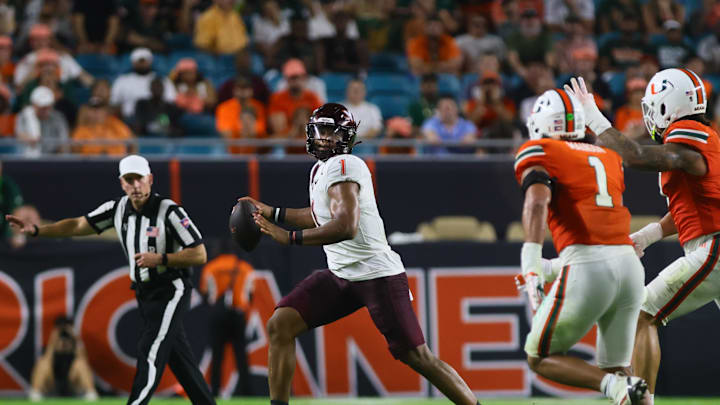Miami enters its game on Saturday against Virginia Tech, second in the ACC, allowing 189.1 passing yards per game. Virginia Tech is last in the ACC, averaging 171.7 passing YPG. Miami should be able to make Virginia Tech one-dimensional offensively.
Virginia Tech was competitive with Miami in 2024 in a 38-34 loss because of a balanced offense. The Hokies ran for 206 yards and two touchdowns on 32 carries. Quarterback Kyron Drones completed 19 of 33 pass attempts for 189 yards, two TDs and one interception and ran nine times for 52 yards against Miami in 2024.
Drones is back for Virginia Tech in 2025 and completing 58.3 percent of his pass attempts for 1,717 yards with 16 TDs and seven interceptions. Drones leads Virginia Tech with 145 carries and nine rushing TDs and is second on the Hokies with 578 rushing yards.
Dalton Wasserman of Pro Football Focus noted Miami has improved from 67th nationally in PFF coverage grade in 2024 to 12th in 2025. Miami is second in yards per coverage snap allowed and with the second-lowest explosive rate nationally. Miami is 10th nationally, allowing eight completions of 30 yards or more.
Miami needs to force VA Tech QB Kyron Drones and his WRs to beat them
Wasserman continued that Drones has a mediocre 66,7 PFF passing grade with 14 big-time throws and 16 turnover-worthy plays in 2025. Virginia Tech's wide receivers are 114th in receiving grade. Ayden Greene leads Virginia Tech with 26 receptions for 421 yards and three TDs. Every other Virginia Tech WR has under 25 receptions and 275 yards in 2025.
If Miami can stop the run and put Virginia Tech into third-and-long situations, it will likely be a long day for the Hokies. On third down and seven yards or longer, Drones has 18 completions in 40 attempts for 194 yards, nine first downs, one TD and two interceptions.
Miami is 10th nationally, holding opponents to 30.3 percent on third down. The Hurricanes are eighth with a 75.2 percent stop rate and allow 1.38 points per drive. Virginia Tech is 101st nationally, averaging 23.3 points per game and 88th, posting 359.3 YPG. Miami is seventh, allowing 14.2 PPG and ninth permitting 270.9 YPG.
